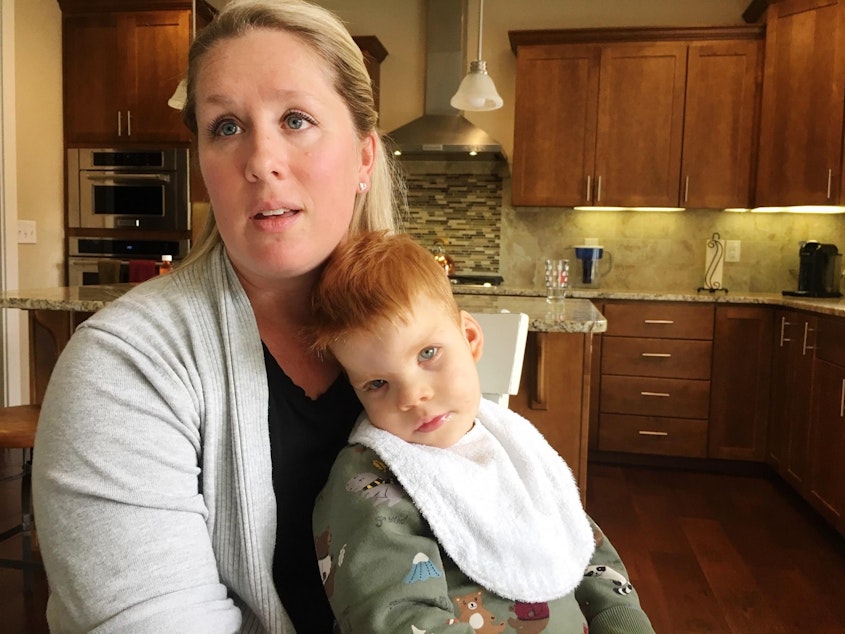13,000+ Washingtonians qualify for developmental disabilities services, but don't get them

Three years ago, Lindsey Topping-Schuetz became a first-time mother when her son Owen was born. He was six weeks early and went immediately to the neonatal intensive care unit, where he spent the next 103 days.
But that was just the beginning of Owen’s challenges and the family’s stresses. Owen was born with two, rare chromosomal abnormalities, including Cri-du-chat syndrome, also known as “cat's cry” syndrome.
In the short-term, Owen required around-the-clock care. He came home from the hospital attached to monitors and a feeding tube.
In the long term, he faced a lifetime of physical and cognitive limitations that would likely require intensive care and therapies. He might never walk or talk.
During Owen’s first year at home, Topping-Schuetz requested services through Washington’s Developmental Disabilities Administration (DDA). In 2018, when Owen was 2 years old, he was evaluated and found to meet DDA eligibility.
In fact, Owen was determined to have such acute needs that he technically qualifies for institutional-level care, which can be an entitlement in Washington. But there was never any question that his family wanted to care for him at home. Subsequently, a case manager determined that Owen and his family would benefit from services such as in-home nursing care, respite care, and specialized medical equipment and supplies.
Sponsored
Then came the surprise: even though Owen was qualified, there were no paid services available because the Medicaid waiver program they were applying for, known as Basic Plus, was capped.
“I had no idea that you could have a child that was so significantly disabled with a black-and-white diagnosis and for the state to not do more to provide support,” said Topping-Schuetz.
Topping-Schuetz and her family were not alone. The state of Washington has more than 13,000 developmentally disabled people on its “No Paid Services Caseload.” About half of them are children. They are individuals, like Owen, who meet the criteria for state services, but don’t get them because the waivers are not an entitlement. The caseload also includes people who have not requested or have declined services, according to DDA.
“We have a certain number of waivers that are funded and that’s what we have to stay within,” said Evelyn Perez, the assistant secretary who oversees the DDA at the Washington Department of Social and Health Services.
Perez recently told a panel of state lawmakers that demand for these services is growing by more than 10 percent a year.
Sponsored
“We don’t come even close to the amount of individuals that are coming through our doors,” Perez said.
It’s not a new problem. Since at least the 1990s, demand for community-based DDA services in Washington has exceeded funding. After the U.S. Supreme Court ruled in 1999 that people with developmental disabilities should be served in the community, in the least restrictive environment, lawsuits were filed against the state, including by the Arc of Washington, an advocacy group. That lawsuit was settled in 2007, with a promise by the state to increase funding for community-based supports.
But the problem didn’t go away. By 2014, The Seattle Times reported the “No Paid Services Caseload” had swelled to 14,600 people. That same year, Washington lawmakers funded an additional 5,000 slots with one-time money.
Since then, the state has continued to grow and demand for services has not let up. Washington currently ranks 30th in the nation for developmental disability services, according to a 2019 report called “The Case for Inclusion.” By contrast Oregon, where services are an entitlement for those who meet eligibility requirements, ranks second in the nation.
“After a while you get sort of angry because you see how state government supports other people and the system for people with developmental disabilities just stays,” said Sue Elliott, the former head of DDA who is now the executive director of the Arc of Washington.
Sponsored
After Owen was born, Topping-Schuetz quit her job at Weyerhaeuser to stay home with him. Her husband, Ben, works for the City of Tacoma. In many ways, Topping-Schuetz said, they’re lucky. The family has good health insurance. They have extended family nearby. Still there have been financial challenges. And attending to Owen’s special needs can feel overwhelming at times.
“It’s exhausting. I’m tired. It’s a 24/7 gig,” Topping-Schuetz said.
Caring for Owen requires her to wear several hats – she’s his mother, his nurse and his therapist.
“We didn’t want or expect that the state would just take care of us, but we had hoped that they would support us to provide a better and best life for Owen, so I go between mad and sad and scared,” Topping-Schuetz said.
It’s unclear how long the family might have to wait for services. This past June, the family’s DDA case manager wrote in an email to them: “Everyone who has been requesting the Basic Plus has been getting denied, unfortunately.”
Sponsored
In the meantime, Owen will turn 3 this month and begin a developmental preschool through the Puyallup School District. He’ll go for two-and-a-half hours a day, four times a week. It will be his mother’s first regular break from being his full-time caregiver since he left the neonatal intensive care unit as an infant.




